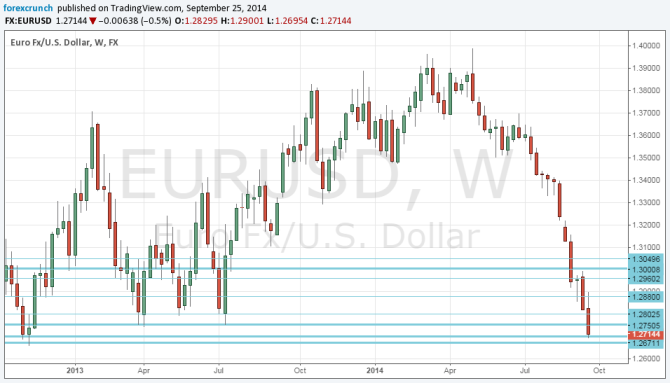EUR/USD totally collapsed and is now trading at the lowest levels since November 2012. A fresh dollar storm in markets combined with a reiteration that the ECB is willing to do more, sent the pair through the double bottom of 1.2750 and it temporarily lost 1.27. Without recapturing 1.2750, there seems to be a lot more room on the downside. A few interesting US figures await us.
Here’s a quick update on technicals, fundamentals and sentiment moving the pair.
- Asian session: The pair traded well within the range..
- Current range: 1.27 to 1.2750.
Further levels in both directions:
- Below: 1.27 1.2660, 1.2620 and 1.2587.
- Above: 1.2750, 1.2820, 1.2870, 1.2920 and 1.2960.
- 1.27 is just a round number. 1.2660 is strong support – where the now broken uptrend began.
EUR/USD Fundamentals
- 7:20 ECB president Mario Draghi talked. He said the ECB could do more, but this is not new.
- 8:00 Euro-zone M3 Money Supply. Exp. +1.9%. Actual 2%.
- 8:00 Euro-zone Private Loans. Exp. -1.5%, actual 1.5%.
- 10:00 Italian Retail Sales. Exp. +0.2%. Actual -0.1%.
- 12:30 US jobless claims. Exp. 294K.
- 12:30 US durable goods orders. Exp. -17.7%. Core orders exp. +0.7%.
- 13:45 US Markit Flash Services PMI. Exp. 59.4 points.
* All times are GMT.
For more events and lines, see the Euro to dollar forecast.
EUR/USD Sentiment
- Extended dollar rally: The US dollar takes only short pauses between its gains, that were most recently inspired by the preparation of Yellen to exit monetary stimulus. A fresh round of dollar buying hit weak currencies such as the kiwi as well as stronger ones such as the pound. This is the main driver for EUR/USD reaching a new low, breaking below the 1.2750 double bottom.
- Draghi ready to act: This is not news, but the comments about being ready to do more, especially after the poor TLTRO, just provided another reason for selling EUR/USD. It is unlikely that the ECB will announce big new measures next week, but more dovish words and more details about the ABS program are now expected.
- Stronger US housing: After a disappointing existing home sales number, new home sales surprised with a 6 year high. While this indicator is volatile, the rise in the currently weakest link in the US economy is certainly encouraging. A dramatic fall in durable goods orders comes on the background of the leap last time. The focus will likely be on jobless claims, that reached levels last seen in 2006.
- Weak German confidence: Germany’s No. 1 think tank reported the lowest business confidence since April 2013. This is the fifth consecutive fall and it joins the weak ZEW number. Also the “expectations” and the “current assessment” components are lower. On the other hand, PMIs were somewhat better: while both French PMIs point to a contraction, the composite outcome is better than expected. German data is decidedly mixed. France is in the limelight nowadays amid growing pressure to reform its economy, while it wants Germany to increase spending.
In our latest episode, we talk about Contango vs. Backwardation, Scottish reverberations and key US data:

